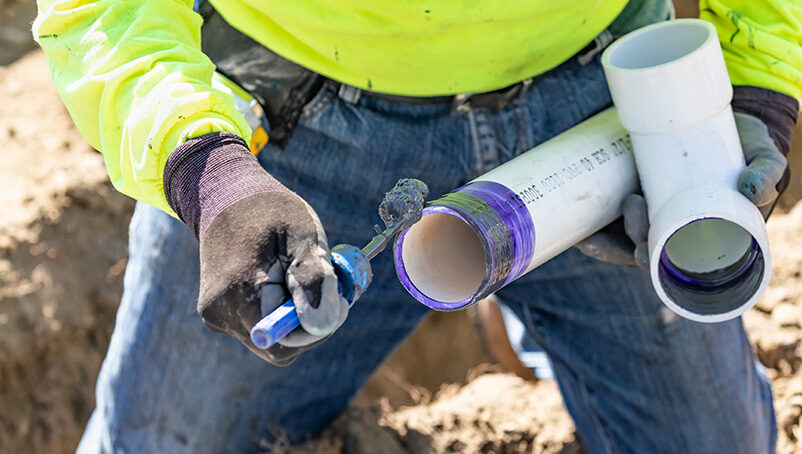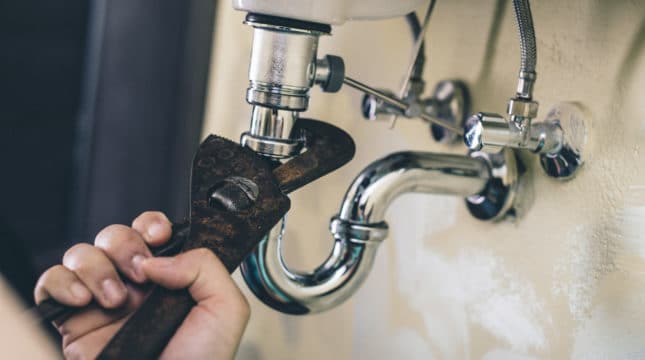Florida plumbers license requirements
In addition to achieving a passing score on the qualifying exam for a plumber license, Florida residents must meet the following requirements:
- Educational/experience requirements
- Demonstrated financial responsibility
- Be of good moral character
Educational/experience requirements
Plumbing license applicants must meet one of the following educational/experience requirements:
- Four-year construction-related degree and one year of plumbing work experience
- One year of experience as a foreman and at least three years of college-level course credits
- One year of experience as a worker, one year of experience as a foreman and two years of college-level course credits
- Two years of experience as a worker, one year of experience as a foreman and one year of college-level course credits
- Four years of experience as a worker or foreman with at least one year as a foreman
You must provide details about your employment history on the application, including your employer’s license number and contact information.
Financial responsibility
You must demonstrate financial responsibility by submitting a personal credit report with a credit score of 660 or higher and no unsatisfied judgments or liens. If you do not meet these qualifications, you must provide a bond or letter of credit.
Completing a 14-hour financial responsibility course will decrease the required amount for the bond or letter of credit.
Moral character
You must disclose your criminal history and pending bankruptcies or previous instances in which a professional license was denied, suspended or revoked. Florida plumbing license applicants must also submit electronic fingerprints to the CILB as part of a complete background check.
Do you need a license to be a Florida plumber?
You must have a certified plumbing contractor license from the Florida Department of Business and Professional Regulation to work as a plumbing contractor in this state.
In Florida, a plumbing contractor is defined as a person “whose contracting business consists of the execution of contracts requiring the experience, financial means, knowledge and skill to install, maintain, repair, alter, extend or, when not prohibited by law, design plumbing.”
This license permits plumbing contractors to work on a wide variety of plumbing and piping projects, such as public or private water supply systems, septic tanks, drainage and supply wells, swimming pool piping, irrigation systems and solar heating water systems.
How to get a plumber license in Florida
Before you submit your Florida plumber license application to the Department of Business and Professional Regulation, you must pass a two-part exam.
Step 1: Take the licensing exam
Sign up for a Florida Construction Industry Licensing Board (CILB) examination at FloridaExam. You must pass both parts of the exam:
- Trade knowledge: You must take the plumbing trade knowledge section in paper and pencil format. This part of the test is administered exclusively in Orlando.
- Business and finance: You may take the computer-based business and finance exam at one of the many testing locations throughout the state.
Step 2: Submit your application
After passing the licensing exam, apply online or print an application and submit it to the CILB by mail. You must include a payment for the non-refundable application fee with your completed application. Since license renewal is required every two years, fees vary based on whether you apply for licensure in an even or odd year.
Typically, the CILB issues licenses within two weeks after approval. Applicants receive a mailed notice about two weeks before the meeting in which the application is scheduled for review.
Insurance for Florida plumbers
To become a licensed plumber in Florida you’ll need business insurance. All certified plumbing contractors in Florida must have the following types of insurance:
- Public liability insurance for $100,000
- Property damage insurance for $25,000
- Workers’ compensation insurance (or an exemption obtained within 30 days of license issuance)
Each certificate of insurance should list the State of Florida Department of Business and Professional Regulation Construction Industry Licensing Board as the certificate holder.
Workers’ compensation insurance
If you or an employee gets hurt on the job, workers’ compensation insurance provides coverage for lost wages and medical expenses.
General liability insurance
General liability insurance covers you if certain types of work-related accidents occur, like property damage or an injury to a client.
Tools and equipment insurance
You can repair or replace work gear that is damaged or stolen with tools and equipment insurance.
Commercial auto insurance
Most plumbers drive to different sites for work, which requires commercial auto insurance. This insurance provides coverage for costs related to a vehicle accident, like towing and repairs.
Commercial property insurance
With commercial property insurance, you’ll get coverage for property damage or vandalism if you own or rent space for your business.
Florida plumber license renewal requirements
Certified plumber licenses expire on August 31 in each even-numbered year. You must pay a $205 renewal fee and complete 14 hours of continuing education to complete the renewal process.
Continuing education requirements
Your required 14 continuing education hours for license renewal must include the following:
- One hour specialized or advanced module
- One hour workplace safety
- One hour business practices
- One hour workers’ compensation
- One hour laws and rules
The remaining hours may include any board-approved construction-related instruction.
Florida plumber license reciprocity
The CILB does not maintain reciprocity agreements with other states for plumber licenses. Plumbers who hold an out-of-state license may be able to apply for endorsement if they meet one of the following requirements:
- Have taken an examination of substantial equivalency to the Florida plumber licensing exam, meet the experience requirements for Florida certification and meet all other requirements for licensure
- Hold a valid plumbing license issued by another state (if that state’s license issuance criteria were substantially equivalent to Florida’s current certification criteria)
How NEXT helps support Florida plumbers
NEXT makes it easy to find affordable plumber insurance, including business insurance and self-employed plumber insurance. We’ve put together thousands of custom insurance packages for contractors like you, and we can help you meet the state licensing requirements for Florida.
Apply for coverage, compare your options, buy insurance and get an immediate certificate of insurance. Log in to your policy via desktop or app 24/7 to make changes and access additional COIs.
Start a free quote with NEXT today.






